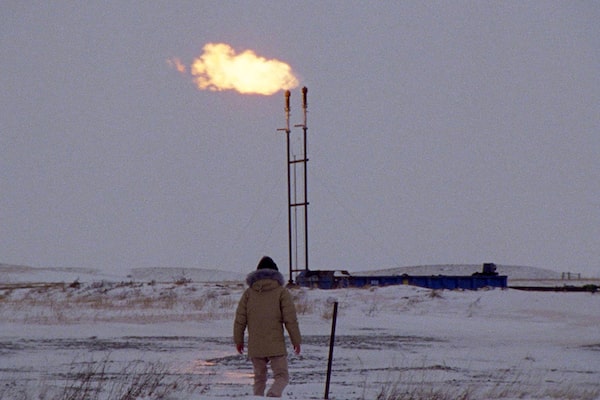
A scene from the film How to blow up a pipeline. Alberta's energy regulator has issued a bulletin warning the film could inspire activists to turn to violence.Courtesy of Elevation Pictures
A new film called How to Blow Up a Pipeline has federal and provincial agencies across North America nervous that climate activists may be inspired to turn to sabotage to get their message across, the Alberta Energy Regulator warned Monday.
How to Blow Up a Pipeline is based on a 2021 non-fiction book of the same title by Andreas Malm, a climate scholar and associate professor in human ecology at Lund University in Sweden. The publisher, Verso Books, describes the book as a call to action for the climate movement to escalate its tactics and force the end of fossil fuel extraction – including by blowing up oil pipelines.
Verso says the heart of Prof. Malm’s manifesto is that “the strategic acceptance of property destruction and violence has been the only route for revolutionary change.” In the film, released earlier this month, a fictional group of environmental activists plots to disrupt an oil pipeline.
The AER said in an online bulletin Monday that the film promotes violent action against oil and gas infrastructure and “should not be taken lightly,” adding it could inspire sabotage that puts activists, communities and industry in danger.
The regulator urged pipeline operators and licensees to increase their level of awareness, and review the security and emergency response protocols they are required by law to have in place.
It also recommended that companies increase surveillance and monitoring of surface pipelines, verify that leak-detection systems and emergency shutdown valves are functioning properly, and report any suspicious activity to the RCMP.
“We have taken additional measures and are prepared to respond should the need arise,” it added, but did not elaborate on what those measures are.
Jay Averill, a spokesperson for the Canadian Association of Petroleum Producers, said that “deliberately sabotaging our country’s vital energy infrastructure would put innocent people in harm’s way and the environment at risk and goes far beyond the bounds of acceptable protest.”
A “Take Action” section on the film’s official website includes a detailed map of pipeline locations in the United States and Canada.
“The pathway to a livable future on this planet is rapidly narrowing,” it says. “If we want to survive we must protect the revolutionaries who take necessary actions to fight the fossil fuel industry and protect our existence.”
Citing the swath of critical infrastructure laws passed in the U.S. since the Standing Rock protests against the Dakota Access Pipeline in 2017, the website says climate activists have been dehumanized and stripped of civil and human rights.
The website also lists links to various activist groups resisting fossil fuel projects, including Amnesty International’s Protect the Protest campaign, a global movement to confront the widening and intensifying efforts by countries to erode the right to protest.
Ketty Nivyabandi, the secretary-general of Amnesty International Canada, said the organization does not condone acts of violence or encourage sabotage, but “we urge decision-makers to address the fossil fuel crisis.”
“These are not hypothetical threats; they endanger human rights now and require decisive action, today,” she said.
The RCMP told The Globe in an e-mail that while the subject of the film “is concerning to police and its fictional content could potentially inspire real attacks on energy infrastructure, the RCMP uses an evidence-based, intelligence-led approach to determine enforcement actions.”